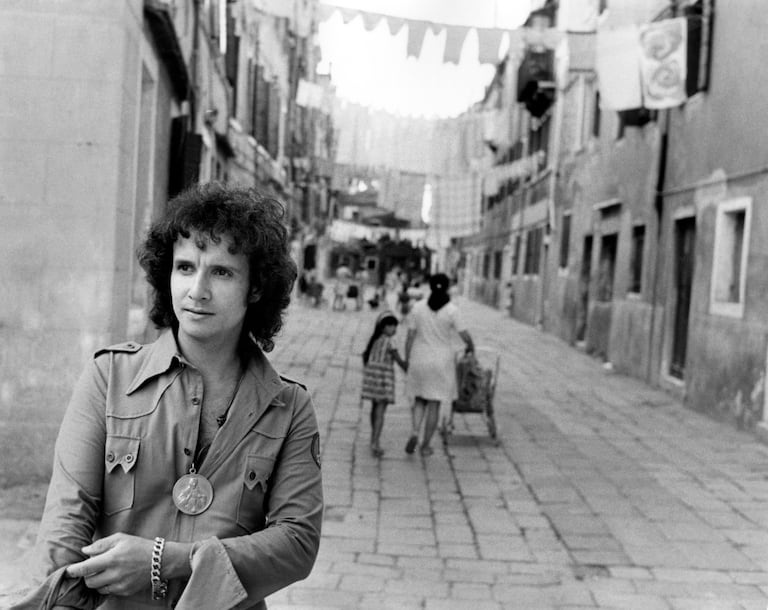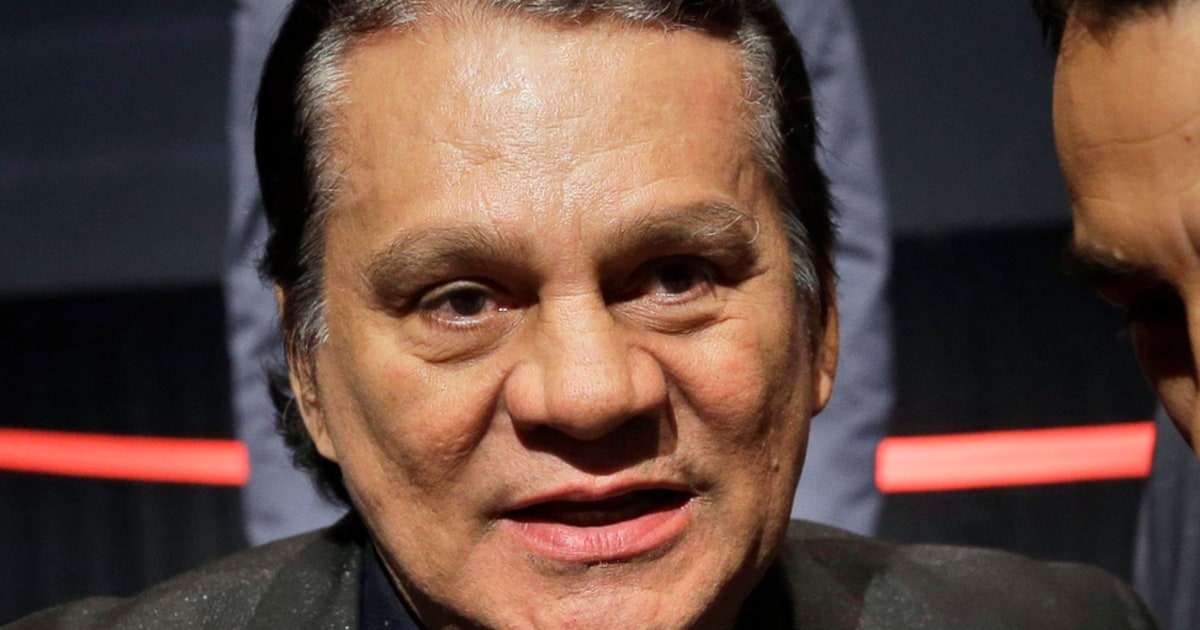Roberto Carlos poses in Venice, Italy, in 1971.Mondadori Portfolio / Mondadori via Getty Images
The melody is familiar and it is difficult to hear it without mentally humming the verses: “Nossa Senhora / Me give a mão / Cuida do meu coração” (Our lady / Give me your hand / Take care of my heart).
What Nando Reis sings over those notes, however, is "Nanananana / Nananana / Nanananananana."
In fact, it does it from start to finish.
As an atheist, it was the way he found to avoid the religious message and include the song, which he finds beautiful, in his album
Não sou nenhum Roberto, mas às vezes chego perto
(I am no Roberto, but sometimes I get closer, in his Spanish translation), released last year and dedicated to the repertoire of Roberto Carlos.
The King did not like it.
And so the vinyl version of the album, released earlier this month, came out without that song, which was replaced by “Como vai você?”
(How are you?) ‚By Antonio Marcos and Mario Marcos, recorded by the singer in 1972.
But it was not the only veto that Roberto Carlos imposed on the vinyl version of the album.
In "Me conte sua historia" (Tell me your story), Nando had to take out a text of his that he declaimed at a certain height and ended up replacing it with a vocalization by the singer Céu.
Some verses did not enter the recording:
"E o cold daquela noite escura
Mistured as the heat of our intertwined bodies
Deixava or packed glass
Wave to ponta de seu little finger
Riscou as you start two nossos nomes
Inside a heart upturned "
("And the cold of that dark night
Mixed with the warmth of our intertwined bodies
Left the glass foggy
Where the tip of your little finger
Scribbled the initials of our names
Inside a dotted heart ")
A few words from Jorge Mautner at the beginning of “A guerra dos meninos” (The boys' war) was also taken out.
And a detail: it is a biblical text, extracted from the Gospel of Luke, that is, refined with the verses.
The songs had been recorded and released last year with the authorization of Roberto Carlos –on that occasion, the only request from Nando that he refused was the re-recording of “Details” (Details) -.
But, it seems, the composer only heard the interference of the São Paulo singer (in all cases, that is, reverent to the essence of the honoree) after the release of the album, or when there was no way to stop it.
That is why the changes have only now arrived.
The veto of Nando's version of “Nossa Senhora” is not the first time that Roberto Carlos has acted in defense of what he believes is best for Jesús's mother.
He has already gone far in his defense.
In 1986, he wrote a telegram to President José Sarney congratulating him on the censorship of the film
Je vous salue Marie
, by Jean-Luc Godard (“which is not a work of art or cultural expression that deserves the freedom to attack the religious tradition of our people and the Christian sentiment of humanity ”, wrote the singer, without having seen the film).
His religious convictions have already made him refuse to record "Se eu quiser falar com Deus" (If he wants to talk to God), by Gilberto Gil.
The
Baiano
composed the song for the King in 1980, but some words in the lyrics, such as "devil" and "horrible", as well as the agnostic tenor of the poetry, did not fit his ideas.
"'If I want to talk to God' is a song that talks about God in a different way than I would, that's why I didn't record it," it came to be justified at that time, according to the historian Paulo César de Araújo in his biography
Roberto Carlos in detail
(prohibited, it is worth remembering, by an agreement with the author after a long legal battle).
A mixture of religiosity and OCD (Obsessive Compulsive Disorder) led Roberto Carlos to veto the recording of “Quero que vá tudo pro inferno” (I want everything to go to hell) to anyone who requested it - “80% of the artists from pop-rock ”, according to his manager, Dody Sirena.
And there is still more.
In 2002, he did not authorize the song to be part of the reissue of the album that Nara León had recorded in 1978, dedicated to him, entitled precisely ...
E que tudo mais vá pro inferno
.
The album was relaunched with one track less and renamed "Debaixo dos caracóis dos seus cabelos" (Beneath the curlers of her hair).
Only in 2016, after 30 years, Roberto sang the word “hell” again.
A few years before, he had already overcome another blockade and intoned the original verse "Se o bem eo mal existem / Você pode escolher" (If good and evil exist, you can choose), from "É precise saber viver" (It is necessary to know to live).
He had spent decades singing "If good and good exist."
His effort to avoid ideas that might suggest something that he identifies as "evil" led, in 2018, to think about rejecting the participation of actress Marina Ruy Barbosa in his end-of-year TV special.
At that time, she starred in a character in the novel "The Seventh Guardian" that Roberto Carlos identified as "half a witch."
In the end, the veto did not materialize and they ended up singing together “Na paz do seu sorriso” (In the peace of his smile).
But Roberto's faith and OCD are not the only reasons for him to be seen as a composer who does not release his songs easily.
Many times, you simply want to protect yourself from what you identify as possible damage to your image.
It was for this reason, for example, that he prevented one of his songs from being used in the
Narcos
series
, about the career of Colombian drug lord Pablo Escobar.
It would not be a free use: the trafficker and his mother were great admirers of the Brazilian (Escobar had a
jukebox
only with songs from the artist), and Roberto Escobar, Pablo's brother, even declared in 2013 that the Medellín cartel hired the singer to a show in the Colombian city in the 1980s. His advice justified the veto of the song in the soundtrack of José Padilha's series: “[Roberto Carlos] analyzed the series, saw where the song would come in and came to the conclusion that it had nothing to do with it ”.
Another occasion in which it is speculated if his scissors acted in defense of his image was in the exhibition on the Globo chain of the film about the life of the musician Tim Maia, directed by Mauro Lima.
Roberto Carlos had already complained about the scene in which, now famous, he was portrayed receiving Tim (his childhood and adolescent friend) indifferently in a dressing room.
Immediately, one of his advisers threw a rolled bill at the author of “Você”, who had gone to look for his friend to ask for help.
When it was shown on television, the scene was removed.
But there were cases of vetoes that had nothing to do with the preservation of his image, or with OCD, or with religion.
Roberto Carlos did not allow the performance of a version that the Aviões do Forró group made of its “Esse cara sou eu” (That guy is me), which at that time was one of the most listened to in Brazil.
I wanted to avoid competition.
At other times there are no identifiable reasons.
Zé Renato never received a response to his request for authorization of the songs composed by the King that he would have liked to include in “É tempo de amar” (It's time to love), the album he made in 2009 with the Young Guardian repertoire.
And Paula Fernandes could not include in her 2014 DVD the songs that she recorded in duet with the singer, but she released him from guilt, attributing the responsibility to the record company.
It is strangely revealing that one of the great victims of Roberto Carlos' vetoes is ... Roberto Carlos himself.
It prohibited
Roberto Carlos
, an official photobiography released in 2014, from having any text other than verses of his songs - despite the publishers' insistence on putting at least epigraphs that would give context to the images.
But the biggest case of self-imposed veto was with his first album,
Louco por você
(Crazy about you), from 1961. The reasons may have to do with the OCD (it is the only one in which he does not appear on the cover), with religion (the track “Não é por mim” –It's not for me– conditions the existence of God to the love of a woman, something unthinkable for the ultra-Catholic Roberto Carlos) or simply with technical and artistic questions (the album presents a immature and personalityless artist).
What is known is that Roberto Carlos never recognized the album or seriously considered its relaunch, and even intervened to remove it from iTunes in 2012, when it was made available by some mistake.
Due to the artistic greatness of his work (built to a large extent with his partner Erasmo Carlos, a faithful squire) and because of its scope (in all the directions that Brazilian society can think of over time), Roberto Carlos has the legitimacy to bear the title of King.
Let him listen to his subjects and understand their messages in all their harshness and affection, even when they arrive in the form of “nanana”.













